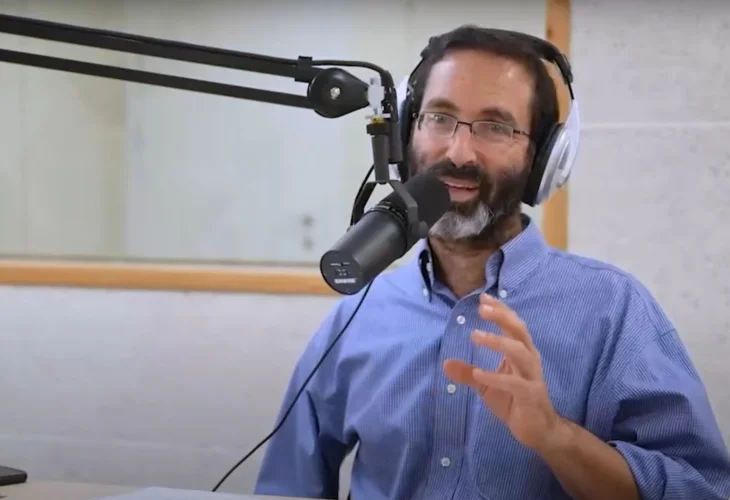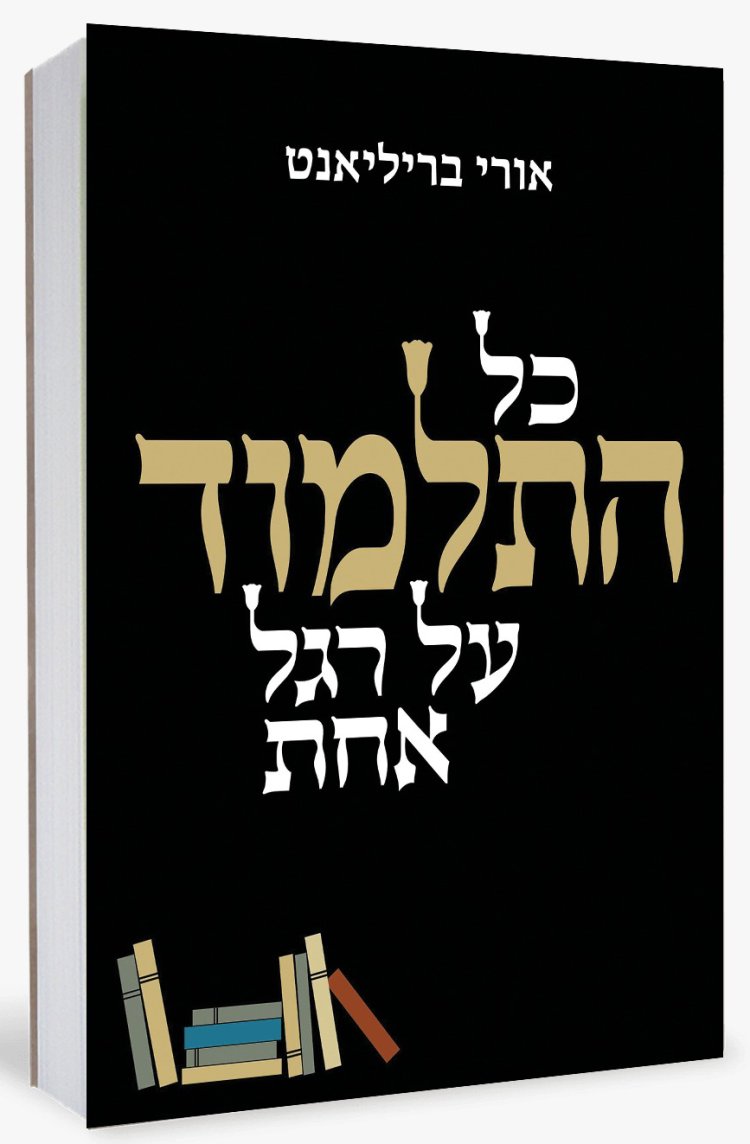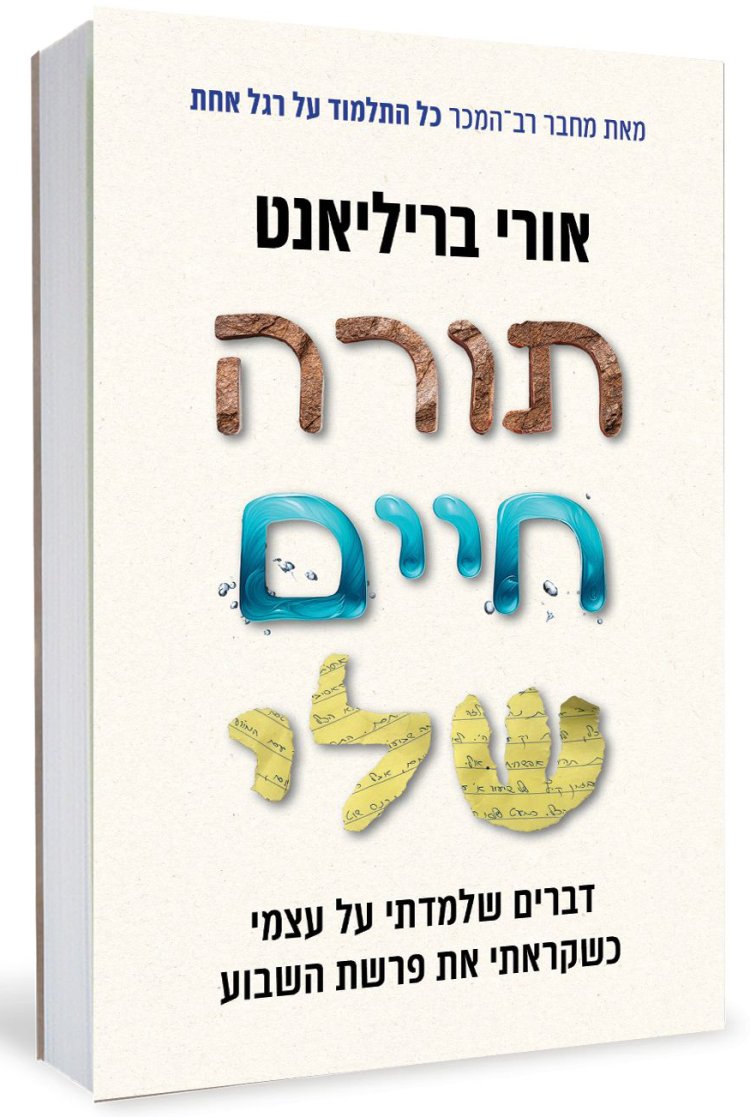The Spaghetti, the Broken Car, and the Hostage Deal: It's All Connected
From a broken car to spaghetti with the kids, and even a hostage deal – these anecdotes are part of Uri Brilliant's book, 'My Living Torah'. Discover the book’s origins and how they link to his unique Talmud study method.
 Uri Brilliant
Uri Brilliant"I didn’t come to tell extraordinary stories, except for a few. I'm an ordinary person, and everything I’ve written in the book involves simple, daily experiences – dentist appointments, the garage, kids' baths, spaghetti, work. Just that," says Uri Brilliant honestly, the author of the bestseller 'All of the Talmud in One Foot', who is now releasing a new book, "My Living Torah."
"The book's idea isn’t to delve into lofty thoughts but to touch upon the everyday lives we all experience, even those that challenge us more, like war, peace, crises, and prayers," he explains. "Personally, I feel these moments constantly reconnect me to the Torah, and that’s precisely the feeling I want to share with others."

With Wit and Articulation
Before delving into Uri Brilliant’s world and pursuits, here’s a clever taste from his new book, from the portion Vayakhel:
"Sometimes I have a touch of OCD. Nothing diagnosed or clinical. Just a little. Locking doors, turning off the stove, going to the bathroom before prayer. It's occasionally bothersome, but not severe. I bet many of you have something similar in different areas. But I have friends and acquaintances with more significant OCD. Intrusive and obsessive thoughts like 'Did I marry the right person? Did I wash my hands properly?' requiring professional help.
"I think that’s precisely the matter with the high priest's headband. Life during the Temple era was OCD heaven. Uncleanness lurked everywhere; a leper, a woman who was Niddah. How could you be sure if your sacrifice was impure? If you were impure, maybe there’s a bone buried underneath from a thousand years ago? The headband reassures: ‘if the blood gets spilled, later found impure – the headband accepts the Passover sacrifice.’ That's it, no need to overthink. Even if the sacrifice ends up impure – it’s all right. Thanks to the headband.
"So, no, I'm not saying those with uncontrolled OCD don’t need treatment. But this offers a perspective of not dwelling on past uncertainties, staying in control, and simply believing everything works out for the best."
Uri Brilliant has been studying and teaching for decades. Born in Raanana, he studied at Midrashiat Noam and Yeshivat Har Etzion. Currently residing in Pardes Hanna with his family, he teaches one of the world's most popular Talmud courses through a novel method made famous on the Daf Yomi portal and his website 'Sinai'. He is well-known for his bestselling book released five years ago, 'All of the Talmud in One Foot'.
What inspired the idea for your new book?
"Maybe it's time for a confession: when I first started studying 'Shnayim Mikra V'echad Targum' seriously, it wasn’t easy. Unlike Talmud which I always loved, this was different. To encourage myself, I began jotting down reflections on the weekly portion. Initially, these musings were just for myself, without aspirations of a book. Then, one day, the publisher Kinneret reached out, noting my previous book’s unexpected success, and asked if I had ideas for another. That’s how the writings became a book."

The Art of Letting Go
About a year ago, my car broke down. A big Hyundai H1 from 2007. A tow truck, followed by the garage replacing the timing chain (3000 shekels). A few months later, it broke again, this time with the whole family stranded at night on Highway 1. Another tow, more repairs, engine repair (12,000 shekels). Months later, another turbo problem (3500 shekels), water leak (forgot the price), then the alternator (2000 shekels), oil seals (850 shekels), and two days later, back to square one. Another tow, garage trip, family stuck nowhere, realizing the engine was gone.
"I can get you an import engine for 10,000 shekels plus VAT, including labor and a three-month warranty," said the mechanic, and despite everything, I still couldn’t decide the right move.
Understanding the art of letting go is delicate. On one hand, don’t give up too soon and miss out, but on the other, don’t give up too late and risk greater damage.
And with children? Abraham, with Sarah's gentle push, ultimately gives up on Ishmael. Isaac more or less gives up on Esau. But not Joseph. With endless patience, he scrutinizes and educates his brothers until it succeeds. How did Abraham and Isaac know when to stop? How did Joseph know not yet?
Today we thankfully don’t remove children from homes, but the dilemma of when to yield remains. One phenomenal story I grew up with tells of when Rabbi Yehoshua Yagel, blessed memory, asked the Chazon Ish whether to expel a particular student from school. The Chazon Ish replied, "No, we don’t give up on any student," a principle I find beautiful. But, what about if just one student negatively affects an entire institution? Clearly, judgment is complex, as shown in this week’s portion. By the way, sadly, we ended up selling the car for parts for a thousand shekels, but what exactly happened in that situation is something you’ll hear in the portion Mishpatim.
How does the process work? Are you daydreaming about these ideas all day long?
"The truth is, that's about right. In a typical week, I consider at least ten ideas for writing, which encompass my whole day. Still, I end up developing only one or two into the writings, either due to time constraints or difficulty in fleshing them out. I'm constantly drawing connections between the weekly portion and life. Oddly, on Shabbat, when I theoretically have more time, fewer ideas come to me, since being at home means less exposure to the kinds of external events that provoke thought. Sometimes I share moral thoughts with my kids and am intrigued by their reactions."
Do you ever come up with an idea you love, but others seem unimpressed?
"Yes, it does happen, mainly at home. I’ll pitch something, enthusiastic, and their blank stares tell me they don’t get what I'm excited about. On the flip side, sometimes I don’t think a particular idea is all that special, yet it receives unexpectedly enthusiastic responses. It makes sense, because what I write are reflections on life, and everyone relates to life in their own way."
Were you worried about sharing your personal life in the book?
"I wasn’t concerned about putting myself out there. I have a very simple, natural side, full of trust and love for people. Just as I don’t judge them, I don’t expect to be cynically judged. Still, there are things I didn't include, especially concerning my family and children. In one chapter, I mentioned forgetting my daughter in the car, and honestly, after hearing people's reactions, I somewhat regretted it. But aside from that chapter, I don’t think there's anything too personal."
A Life's Project
Is there a particular section of the book you feel most connected to?
"Not one particular part, but all the sections mentioning my sister Shira, of blessed memory. She passed away about a year and a month ago, a week before Rosh Hashanah. Until then, I’d been writing extensively; after her passing, I felt I’d exhausted my words, yet after sitting shiva, I began writing about her, which opened a flood of thoughts – about her, her life, inevitably tying into the weekly portion. Naturally, the sections that mention her are what I feel most connected to in the book.
"In one section, I compare Shira’s character to our patriarch Abraham. Shira always did what she believed had to be done, indifferent to others’ opinions or beliefs around her. For example, she spent seven years studying medicine, then decided she wanted to work in social services, so she picked up that new path. Two weeks before she passed, she arranged with a psychiatric unit to pursue a master's there. Her decisions perplexed many, but she was always swimming upstream, behaving according to her understanding of what was right for her."
And finally, what’s your next project?
"As mentioned, I’m deeply involved in delivering short, straightforward Talmud lessons via a revolutionary method – it's the main project that keeps me busy daily, from eight in the morning to two at night, through the 'Sinai' site.
"But yes, I’m also working on a book I've been developing for several years now. It's about Rabbi Chaim of Brisk, aiming to make his innovations accessible and share his life story. When I began, I didn’t anticipate the effort this would require, as it's vastly different from interpreting the weekly portion; it demands extraordinary concentration and effort, first to grasp the concepts myself, then to articulate them for others. Clearly, this isn’t going to be simple, and there’s a long road ahead, but it’s destined to be a project aiding many people."

